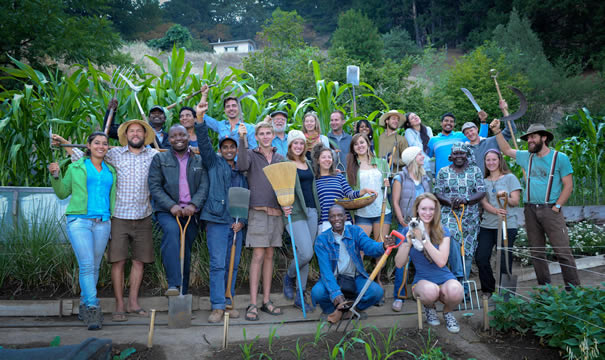Garden Report:
Interns, apprentices and staff at day of classes at EAH Mini-Farm During one of his many lectures, Alan Chadwick shared these words: "You can't have a garden for 'me,' for that is the beginning of the end. Your garden is one that you must enter forwards and go out of backwards, in utter reverence and obedience to the great law that governs it." Chadwick spoke these words in 1975, but they are likely even more relevant today than they were then. And it's probably safe to say that especially in the developed world, we need regular reminders that we are ultimately not in control. In the Ecology Action Headquarters (EAH) Mini-Farm, there are often "me" moments, and these can be good—we should take responsibility for what we do in the garden. We can be proud of a bed of small sorghum seedlings that we nurture into a small thick forest of both soil food and people food. We ought to get excited about our individual capability to work with nature to regenerate soil. But the benefit of communal gardening becomes extremely clear during the summer months when the Ecology Action team expands to include many interns who contribute at the different mini-farm sites. This is especially true during some of the more monotonous tasks that have always been a part of small-scale food raising. Threshing and winnowing grain is an example. Many of us have seen the process on film, baskets and breezes involved, rarely a solo effort. And this is how it goes in our gardens—we team up, dive into bundles of rye, wheat, triticale, barley, or oats (or quinoa, amaranth, sorghum, millet and corn later in the year), and through our teamwork, we emerge with grain fit for the table (and seed to plant for the next year!), with chaff and stalks ready for the compost pile. Not only are collective garden tasks completed in a more fun, timely way, but collective learning is so much more effective as well. All of the 6-month interns were part of the 5-day Teachers Workshop in mid-July, about halfway through the 6-month internship. This week was packed full of garden demos and deeper explanations of concepts, theories, and experiences, but perhaps the most valuable component was the interactive discussion that occurred. Over a dozen minds came together to think critically, creatively, and with cultural sensitivity about a wide range of topics, from transplanting to fundraising, double-digging to data recording, composting to complete-diet mini-farming. Truly an enriching week, largely due to the diversity, engagement and collaboration of the interns! Several times this summer, Fatou, one of our interns from Sénégal, has said to me, "Your garden is very nice!" Appreciating the compliment, I always correct her: "Our garden". And so it is!
top | Newsletter Home | Article Index | Archive
|



